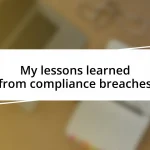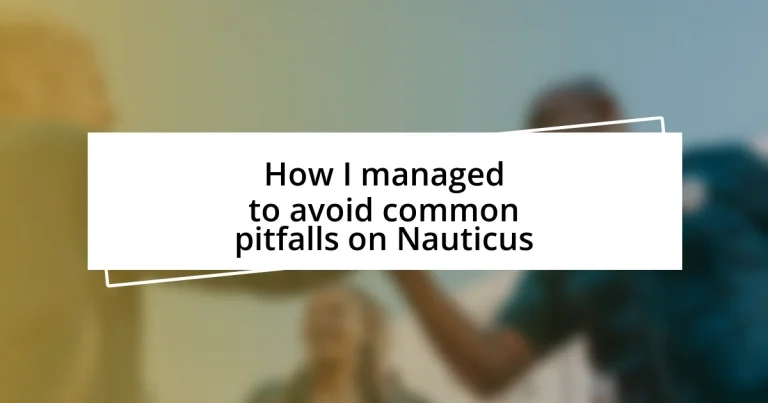Key takeaways:
- Effective communication and strategic planning are vital for success in Nauticus, preventing miscommunication and enhancing teamwork.
- Learning from both personal and others’ mistakes, including engaging with tutorials and staying adaptable, can significantly improve gameplay.
- Ongoing evaluation of gameplay experiences and welcoming feedback from the community fosters continuous improvement and growth as a player.
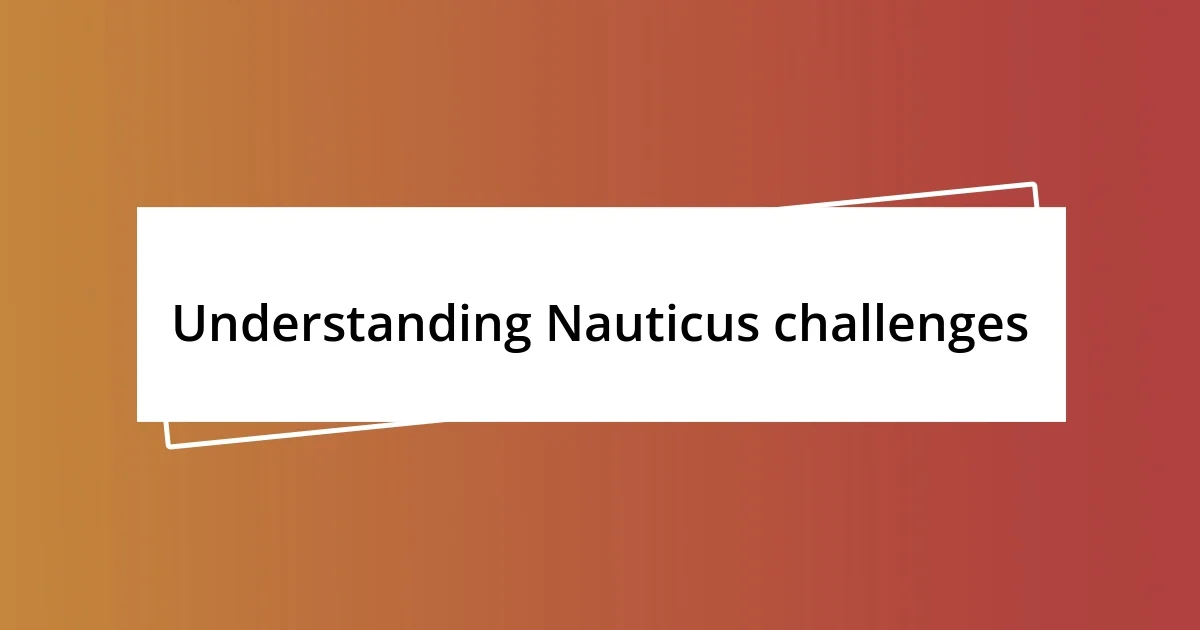
Understanding Nauticus challenges
Nauticus presents a unique set of challenges that can easily trip up even the most seasoned players. I remember facing a moment when I was overwhelmed by the game’s intricate mechanics; it felt like I was wading through a sea of confusion. Have you ever found yourself stuck, questioning whether you’re playing the right way? That initial frustration is something many of us share, as Nauticus demands both strategy and adaptability.
Navigating the complexities of resource management can also be a daunting task. There was a point during my gameplay when I hoarded resources, thinking that more was better. But then, I realized that a careful balance was crucial for advancing. It’s a lesson I learned the hard way, and I often wonder how many others have made the same mistake before finding their footing.
Another significant challenge lies in understanding the social dynamics within the game. I vividly recall the tension in cooperative missions, where miscommunications led to near-failures. It made me realize how vital communication is in Nauticus. How do you manage those interactions? My approach now includes constant dialogue with teammates, which has transformed my gameplay into a smoother and more enjoyable experience.
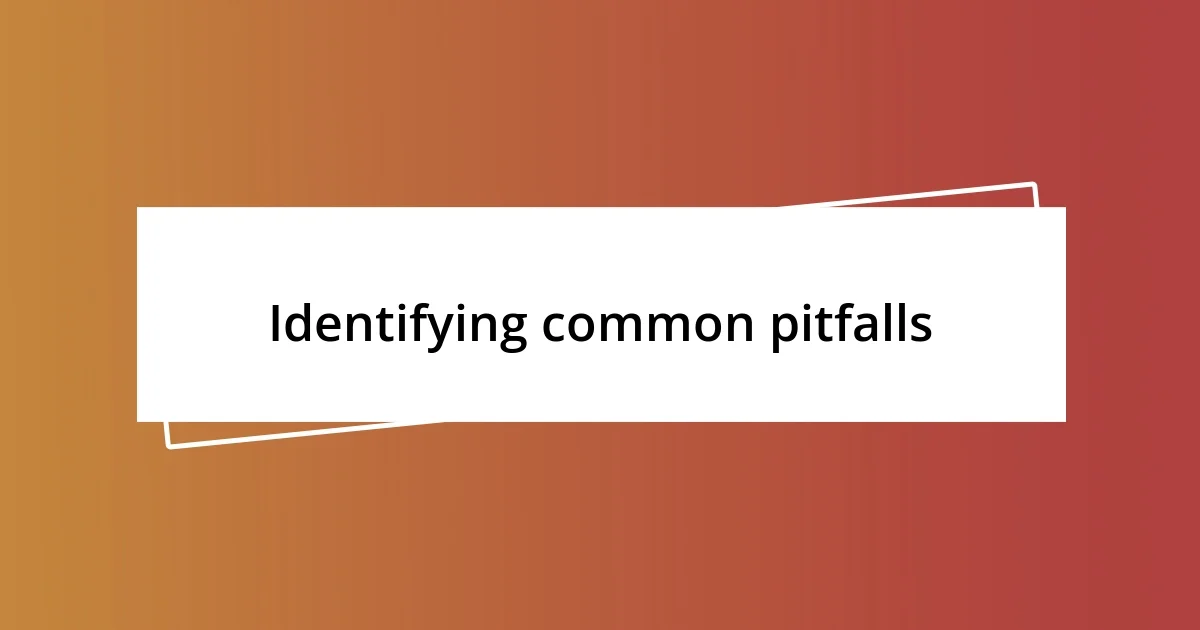
Identifying common pitfalls
Identifying common pitfalls in Nauticus is crucial for a smoother gaming experience. One major pitfall I encountered was rushing into missions without a solid strategy. Early on, I dove headfirst into an expedition, only to find myself outmatched and scrambling to keep up. I learned that taking time to plan and communicate with teammates can significantly enhance success rates—as they say, “fail to prepare, prepare to fail.”
Another challenge I faced was underestimating the importance of adapting my playstyle. I remember stubbornly sticking to a single strategy, thinking it would carry me through. But as I progressed, it became clear that flexibility was key in navigating the ever-changing scenarios of Nauticus. I began to experiment with different approaches, and magical moments happened when I discovered the perfect tactic for a specific challenge.
Lastly, I often neglected the tutorial elements that the game offered. In my excitement, I skipped over those prompts thinking I could figure it out. This led to a series of avoidable mistakes that cost me dearly. I eventually realized that those tutorials were designed to help players like me, providing valuable insights that can save hours of frustration. Now, I gladly absorb any guidance offered, and it has transformed my gameplay for the better.
| Common Pitfalls | Consequences |
|---|---|
| Rushing into missions | Increased risk of failure |
| Sticking to one strategy | Loss of opportunities to optimize play |
| Ignoring tutorials | Potential for unnecessary mistakes |
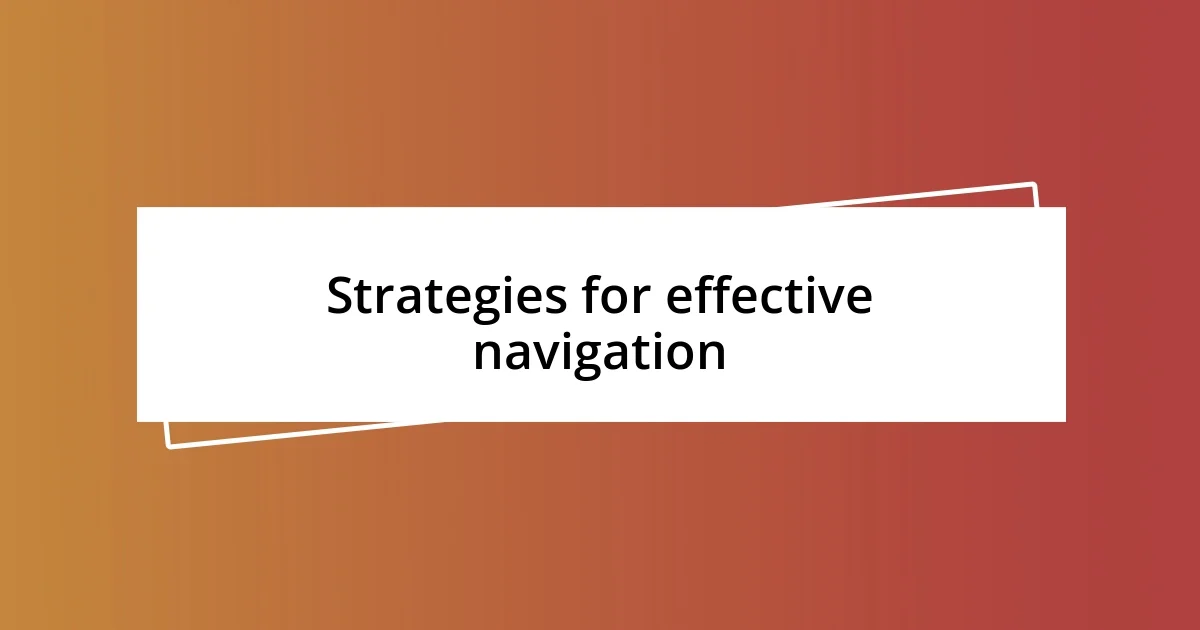
Strategies for effective navigation
Effective navigation in Nauticus is essential to enjoy the game fully. I vividly remember a time when I floundered during a complex mission, feeling like I was lost at sea despite my best efforts. I quickly learned that mapping out not just routes but also resource allocations was vital. Embracing a proactive mindset truly shifted my gameplay.
- Utilize map markers: Mark key locations on your in-game map for easy reference. This small step dramatically improved my navigation and reduced anxiety during missions.
- Prioritize communication: Sharing insights with teammates can create a collaborative synergy. I once turned my mission around simply by suggesting a route based on a teammate’s strengths.
- Watch expert gameplay streams: Observing seasoned players can reveal strategies I hadn’t considered before. It brought a new excitement to my gameplay when I discovered tips that made navigation feel more intuitive.
Another strategy that helped me navigate effectively was maintaining a consistent schedule for resource collection. It’s easy to get swept up in immediate objectives, ignoring the long-term benefits. I once found myself scrambling for crucial materials before a big mission after neglecting my resource pools for days. By establishing a routine, I not only ensured I had what I needed but also fostered a sense of control over my gameplay experience.
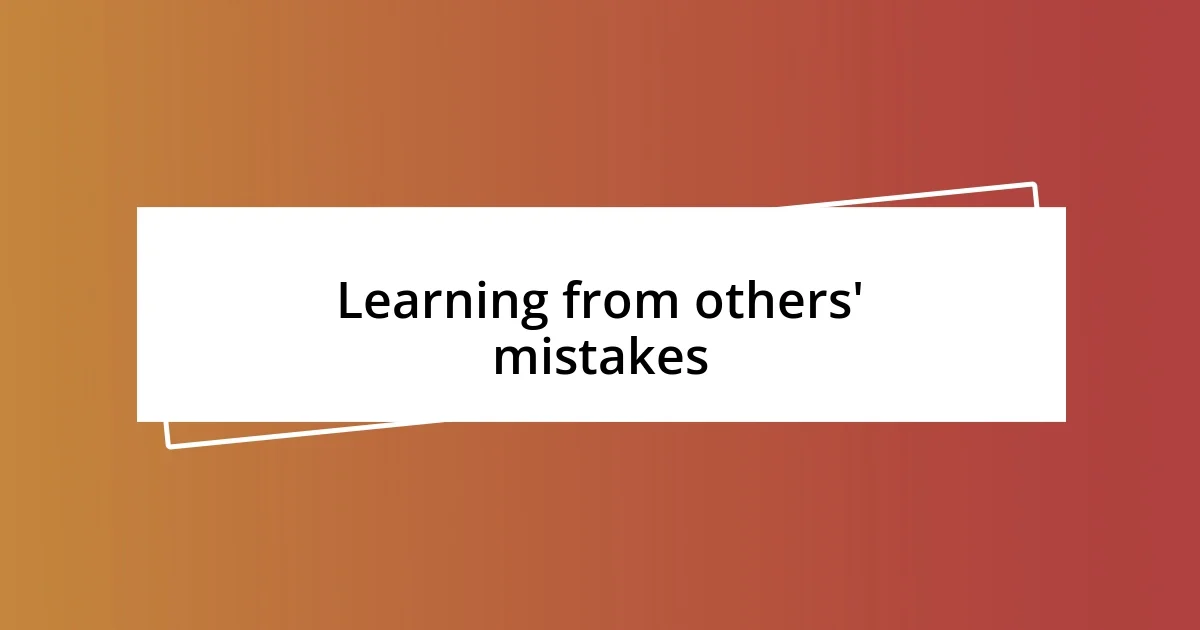
Learning from others’ mistakes
Learning from others often feels like a cheat code in gaming. I remember when a fellow player shared their tale of rushing into a boss fight, only to emerge defeated and frustrated. Hearing about their experience made me take a step back before I tackled tough encounters. Instead of diving in recklessly, I began to assess my gear and tactics, asking myself, “What could go wrong if I don’t prepare?”
One of the biggest lessons I absorbed from other players’ blunders was the fallout of sticking to a single approach. I saw someone persistently using the same strategy on a challenging level, and to their dismay, they kept hitting a wall. This helped me realize how important it is to stay adaptable. I felt a sense of relief knowing that experimenting doesn’t just mitigate risk; it opens up new pathways for success that I might have never considered.
I often wonder how many players skip over tutorials, thinking they won’t add anything valuable to their experience. I used to be one of them until a friend recounted their woes about misunderstanding critical game mechanics. Their frustration reminded me of a time I overlooked a helpful tip during my gameplay, leading to significant setbacks. Now, I make it a point to engage with the tutorials—imagine the time I could’ve saved had I learned from someone else’s mistakes right from the start.
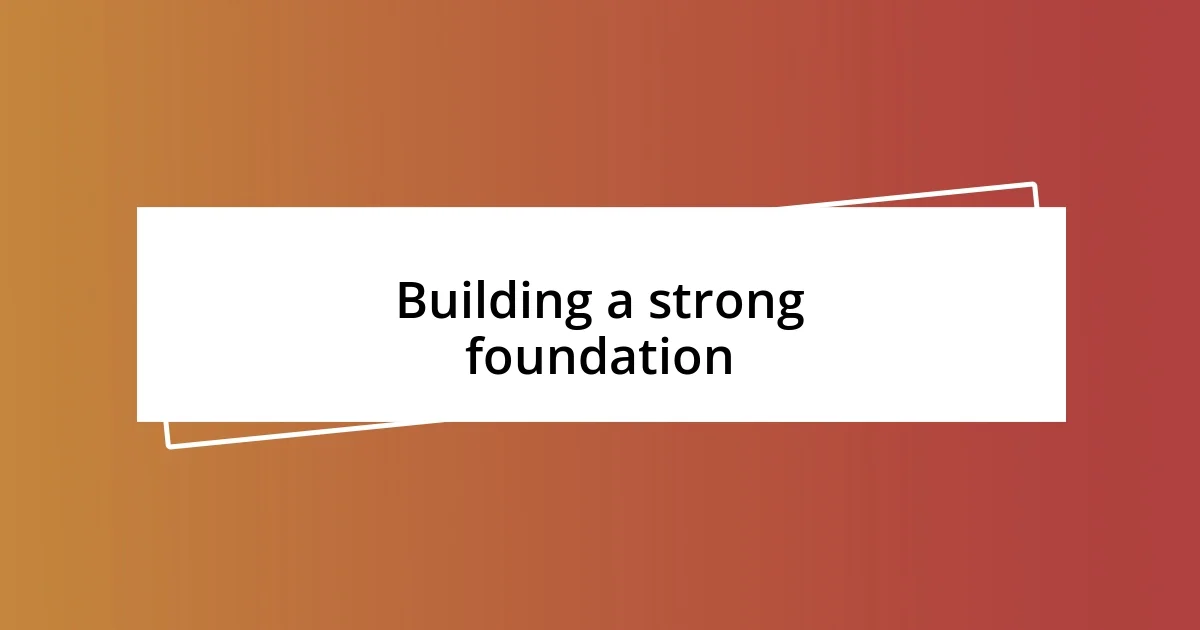
Building a strong foundation
Building a strong foundation in Nauticus isn’t just about the gear you choose; it’s about the mindset you cultivate. I recall a time when I rushed into gameplay without fully understanding the mechanics, thinking I could wing it. That brute force approach left me feeling overwhelmed and disheartened. Taking the time to understand the core aspects of the game transformed my experience, making each session feel more manageable and fulfilling.
One crucial piece of advice I wish I had known earlier is the importance of setting realistic goals. Early on, I aimed for ambitious targets that felt just out of reach. After several frustrating attempts, I learned to break those goals down into smaller, achievable steps. This tactic not only boosted my confidence but made successes feel even more satisfying, like collecting small treasures on a long journey. Have you ever felt that sense of accomplishment from achieving a goal, no matter how small? Those moments reaffirmed my dedication to building a solid foundation before diving into more complex challenges.
Establishing a routine played a pivotal role in my success as well. Instead of chaotic bursts of playtime, I began to structure my sessions, dedicating time for exploration, resource gathering, and skill development. I’ll never forget that satisfying feeling when everything flowed seamlessly because I had prepared ahead of time. It’s like the game itself rewards you for your diligence. Can you relate? Those strong foundations create a sense of stability, allowing you to navigate the turbulent seas of Nauticus with confidence and purpose.

Staying informed and adaptable
Staying informed in Nauticus has been one of my greatest assets. I remember joining forums and communities where seasoned players shared invaluable tips. Their insights became my compass, guiding me not only through quests but also in understanding the game’s evolving landscape. Each post or discussion was like a nugget of wisdom that I tucked away for future reference. How often do you find clarity in community discussions?
Adaptability, on the other hand, is an art form that I gradually mastered. There was a time when I stubbornly clung to a specific playstyle, thinking it was my winning ticket. It took a few humbling defeats before I realized I needed to pivot. This shift changed everything; by embracing different strategies, I found myself savoring unique experiences and overcoming challenges that once felt insurmountable. Have you ever felt that exhilarating rush when a new approach pays off?
I truly believe that staying updated with game patches and developments is crucial in shaping your gameplay. I still vividly recall the moment a major update was released, completely shifting the dynamics of certain skills. By dedicating time to read patch notes and understanding their implications, I managed to stay ahead of the curve. This proactive approach not only enhanced my gameplay but also deepened my connection with the game’s community. How could knowing the latest changes not leave you prepared for whatever comes next in Nauticus?
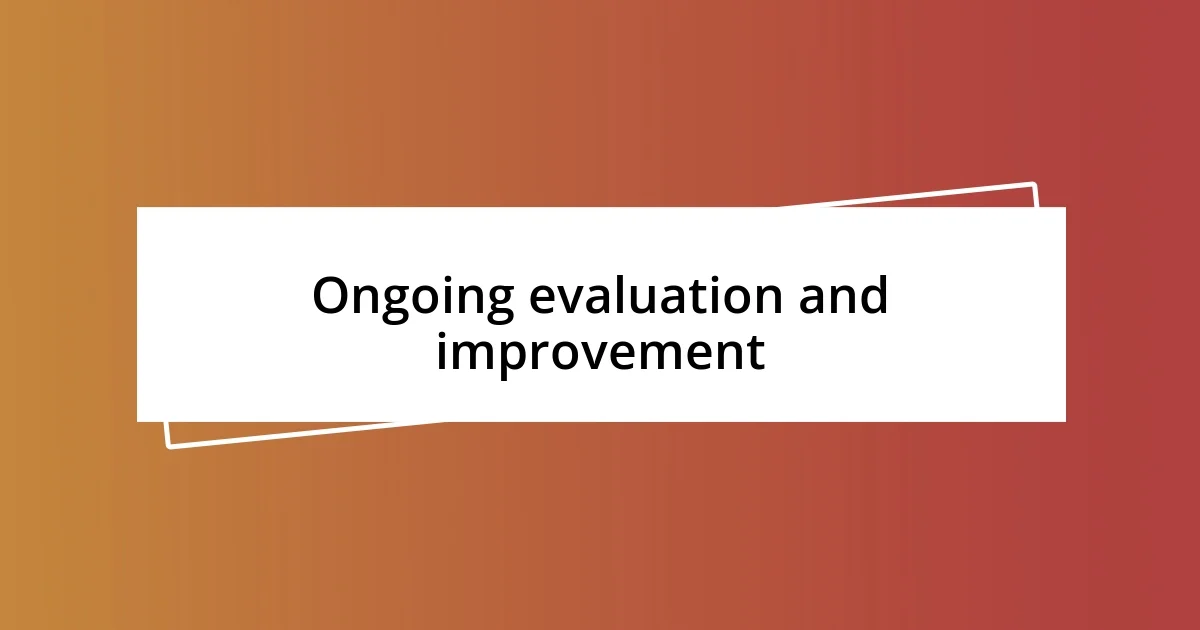
Ongoing evaluation and improvement
Ongoing evaluation has been essential in my Nauticus journey. After each session, I took a moment to reflect on what went well and what didn’t. It’s like reviewing a game tape; I learned from my mistakes and celebrated my victories, however small. Have you ever paused to analyze your own gameplay? Those moments of reflection helped me refine my strategies and adapt my approach, making each subsequent session sharper and more rewarding.
Improvement in Nauticus isn’t just an endpoint; it’s a continuous cycle. I remember the excitement I felt when I set up a journal to track my progress. It became a personal benchmark—recording my wins, losses, and the new tactics I picked up along the way. This practice transformed my perception of challenges. Instead of being roadblocks, they became opportunities for growth. How do you measure your improvement in a game that constantly evolves?
Embracing feedback has also played a pivotal role in my ongoing evaluation process. At one point, I sought input from fellow players after a particularly tough battle. Their constructive criticisms were tough to hear but ultimately invaluable. This openness to external perspectives broadened my understanding and pushed me to reconsider my gameplay choices. Isn’t it fascinating how collaboration can enrich our experiences? Each interaction reinforces the idea that improvement thrives in a support network, reminding me that we are all on this journey together, learning from one another.
